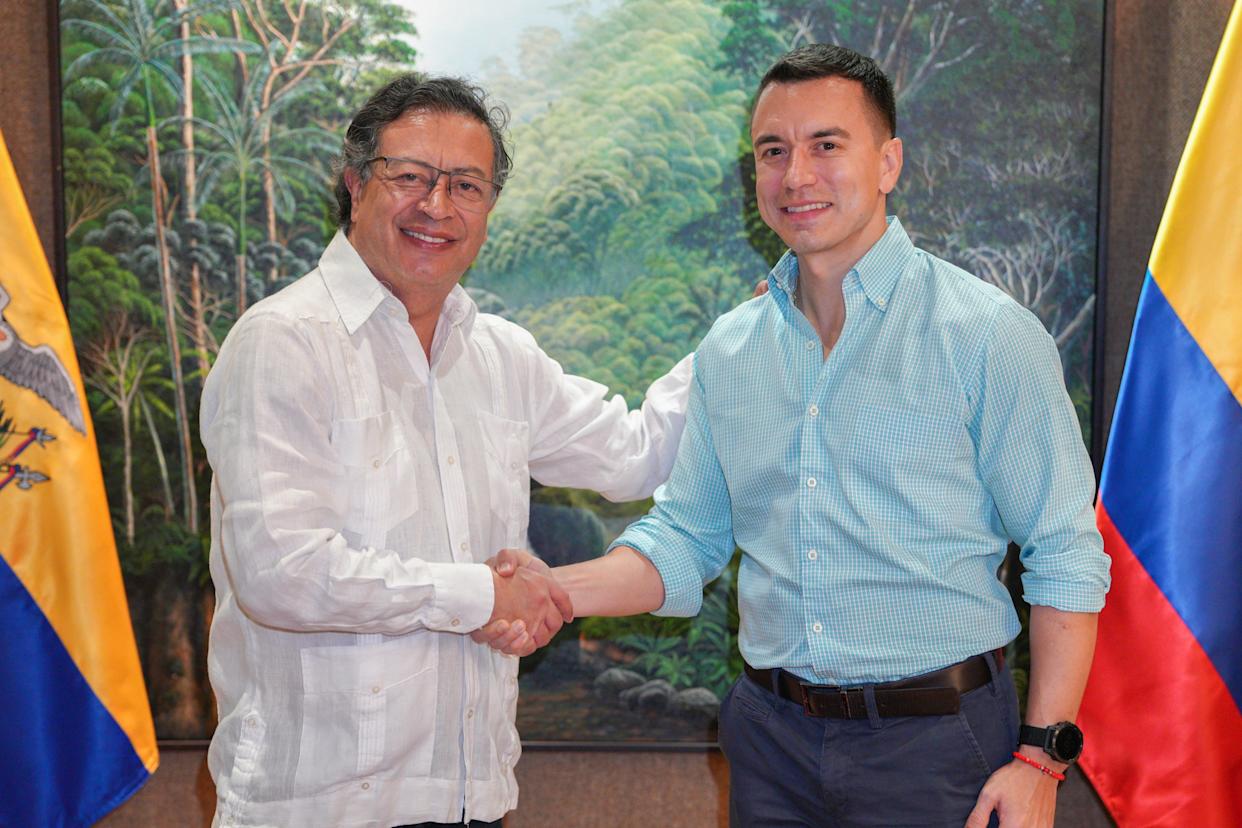Central America
Deal ends Honduran legislative crisis as rebel backs down

AFP
A legislative crisis that threatened the presidency of Honduras’ first woman President Xiomara Castro, was resolved on Monday after rebel lawmaker Jorge Calix signed a deal to withdraw his claim to be speaker of congress.
Calix had led a band of 17 dissidents from leftist Castro’s Libre party who refused to honor a pre-election agreement that helped the wife of former president Manuel Zelaya earn a history-making victory last November.
The presidential candidate of a rival party — Salvador Nasralla — agreed to withdraw his bid and support Castro in return for the position of vice president if she won.
But he also wanted a member of his Savior Party of Honduras (PSH) — Luis Redondo — to be speaker of congress.
In the lead-up to Castro’s inauguration, Calix complicated matters as 17 dissidents and the right-wing opposition elected him as the head of congress in a parallel session while the rest of the Libre party voted in Redondo, sparking the crisis.
“Even though at one time we did not share the planned strategy … we are prepared to respect the decision to support deputy Luis Redondo Guifarro to preside over the board of directors of the National Congress in compliance with our president’s mandate,” said the agreement signed by Zelaya, who is the Libre party coordinator, Calix and the other rebels.
Describing himself as a loyal servant, Calix said he was signing the deal not for his own political career but because it was “what is best for the Honduran people at this time.”
The right-wing National Party (PN) opposition “celebrated” the agreement but proposed that a new legislative vote be held to elect Redondo.
Libre is the single largest party in the 128-seat Congress but with 50 legislators does not enjoy a majority.
In fact, the right-wing PN (44 seats) and Liberal (22) parties — traditional opponents that long dominated Honduran politics — make up more than half of congress.
Central America
Nicaraguan Exiles to Mark 7th Anniversary of 2018 Protests with Global Commemorations

The Nicaraguan opposition in exile announced on Thursday that it will commemorate the seventh anniversary of the April 2018 protests against the government of President Daniel Ortega and his wife, Rosario Murillo, with events in Costa Rica, the United States, and several European countries.
The commemorative activities—which will call for justice for the victims, as well as freedom and democracy for Nicaragua—will include religious services, public forums, cultural fairs, and other public gatherings, according to official announcements.
In April 2018, thousands of Nicaraguans took to the streets to protest controversial reforms to the social security system. The government’s violent response quickly turned the demonstrations into a broader call for the resignation of President Ortega, who is now 79 and has been in power since 2007.
The protests resulted in at least 355 deaths, according to the Inter-American Commission on Human Rights (IACHR), although Nicaraguan organizations claim the toll is as high as 684. Ortega has acknowledged “more than 300” deaths and maintains the unrest was an attempted coup d’état.
International
Arsenal stun Real Madrid at the Bernabéu to reach Champions League semifinals

Arsenal enjoyed a “historic night” on Wednesday after defeating Real Madrid 2-1 at the Santiago Bernabéu, knocking them out of the Champions League quarterfinals, midfielder Declan Rice said.
“It’s such a special night for this club, a historic night for this club,” said Rice, who scored twice in the first leg in London, speaking to TNT Sports.
The English international was named Man of the Match in both legs — the 3-0 win in London and the second leg in Madrid.
“It’s amazing. I knew we were on an upward trajectory and we’ve done incredibly well in this competition. We deserve it and we have full confidence in our coach. Reaching the semifinals is unbelievable,” Rice added.
Central America
Petro questions Ecuador’s vote, cites reports of military control and arrests

Colombian President Gustavo Petro said Tuesday he had received “concerning” reports regarding Ecuador’s presidential runoff election held last Sunday, and called for greater transparency—drawing a parallel with Venezuela.
“Colombian observers were sent to Ecuador’s elections. The reports I’ve received are troubling,” Petro wrote on his official account on X (formerly Twitter).
Ecuadorian President Daniel Noboa secured reelection in the second round with 55.6% of the vote, defeating correísta candidate Luisa González, who received 44.4%. The election results were endorsed by international electoral observer missions from the European Union and the Organization of American States (OAS).
Petro pointed to alleged irregularities, stating: “Leonidas Iza, an Indigenous former candidate, was detained days before. Areas with a majority of opposition support were placed under a state of emergency and military control two days before the election.”
-

 Central America4 days ago
Central America4 days agoHonduran Police Offer $135K for Tips Leading to the Arrest of Romeo Vásquez
-

 Central America3 days ago
Central America3 days agoPetro questions Ecuador’s vote, cites reports of military control and arrests
-

 International4 days ago
International4 days agoMPV Denounces Electoral Blockade as Secretary-General is Disqualified for May Elections
-

 International2 days ago
International2 days agoArsenal stun Real Madrid at the Bernabéu to reach Champions League semifinals
-

 International4 days ago
International4 days agoMaduro Plans Major Workers’ March on May 1st to Defend Venezuela’s Freedom
-

 International2 days ago
International2 days agoBogotá residents line up for yellow fever vaccine amid national alert
-

 International1 day ago
International1 day agoDominican ‘False Hero’ Arrested for Faking Role in Nightclub Collapse That Killed 231
-

 International2 days ago
International2 days agoDeSantis’ immigration crackdown sparks alarm in Venezuelan Communities in Doral
-

 Central America1 day ago
Central America1 day agoNicaraguan Exiles to Mark 7th Anniversary of 2018 Protests with Global Commemorations
-

 International2 days ago
International2 days agoMexico refuses to restore ties with Ecuador while Noboa remains in office
-

 International3 days ago
International3 days agoColombia: Search continues for missing limb of italian scientist found dismembered















